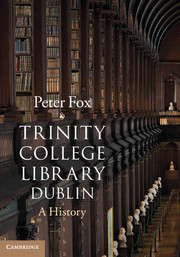Book contents
- Frontmatter
- Dedication
- Contents
- List of illustrations
- List of tables
- Acknowledgements
- Abbreviations
- Introduction
- 1 Early days: 1592–1640
- 2 Ussher, Kells and Durrow: 1641–1665
- 3 Alexander, Bath and the Jacobites: 1666–1708
- 4 A new building: 1709–1737
- 5 Stearne, Gilbert and Lyon: 1738–1749
- 6 The Library in 1750
- 7 Leland to Barrett: 1751–1800
- 8 Fagel: 1798–1809
- 9 Barrett: 1801–1821
- 10 Sadleir, Wall and Todd: 1822–1851
- 11 The Library in 1850
- 12 Todd as Librarian: 1852–1869
- 13 Malet and Ingram: 1869–1886
- 14 Abbott: 1887–1913
- 15 Smyly: 1914–1948
- 16 The Library in 1950
- 17 Parke: 1949–1965
- 18 Professional management: 1965–1983
- 19 Epilogue: 1984–2003
- Appendix 1 Librarians, Assistant Librarians and Deputy Librarians1
- Appendix 2 Growth of the collection
- Appendix 3 The Library oath and declaration
- Sources and select bibliography
- Index of Trinity College Dublin manuscripts
- General index
- Plate Section
- References
2 - Ussher, Kells and Durrow: 1641–1665
Published online by Cambridge University Press: 05 June 2014
- Frontmatter
- Dedication
- Contents
- List of illustrations
- List of tables
- Acknowledgements
- Abbreviations
- Introduction
- 1 Early days: 1592–1640
- 2 Ussher, Kells and Durrow: 1641–1665
- 3 Alexander, Bath and the Jacobites: 1666–1708
- 4 A new building: 1709–1737
- 5 Stearne, Gilbert and Lyon: 1738–1749
- 6 The Library in 1750
- 7 Leland to Barrett: 1751–1800
- 8 Fagel: 1798–1809
- 9 Barrett: 1801–1821
- 10 Sadleir, Wall and Todd: 1822–1851
- 11 The Library in 1850
- 12 Todd as Librarian: 1852–1869
- 13 Malet and Ingram: 1869–1886
- 14 Abbott: 1887–1913
- 15 Smyly: 1914–1948
- 16 The Library in 1950
- 17 Parke: 1949–1965
- 18 Professional management: 1965–1983
- 19 Epilogue: 1984–2003
- Appendix 1 Librarians, Assistant Librarians and Deputy Librarians1
- Appendix 2 Growth of the collection
- Appendix 3 The Library oath and declaration
- Sources and select bibliography
- Index of Trinity College Dublin manuscripts
- General index
- Plate Section
- References
Summary
The first four decades of the seventeenth century were a time of relative peace and increasing prosperity for the fledgling College, but in 1641 all was to change, in the wake of the political upheavals under way across the water. Wentworth, the former Lord Deputy and later Earl of Strafford, was executed in May 1641. Four years later the same fate befell William Laud, Archbishop of Canterbury and Chancellor of the University of Dublin. In 1640, James Ussher, who was the Vice-Chancellor, as well as Archbishop of Armagh, made a routine visit to England, from which he never returned. Rebellion broke out in Ireland in October 1641, and the Provost, Richard Washington, along with several of the Fellows, followed the Vice-Chancellor to England. The College, which had already been forbidden by Parliament to elect any more Fellows, remained without a Provost until 1645. Throughout the anarchy of the 1640s it staggered on, receiving very few students and being forced to sell plate to survive, because many of its estates had fallen into the hands of the insurgents and income from rents had almost dried up. It received a little help from the government in the form of small grants, but these were hard won. One petition to the Lords Justices described the College as being in danger of having to be dissolved through poverty, and pleaded that, even if the scholars could not be kept together, ‘for the preservation of learning…at least the fabric of the house and public library may be preserved’.
- Type
- Chapter
- Information
- Trinity College Library DublinA History, pp. 21 - 33Publisher: Cambridge University PressPrint publication year: 2014



